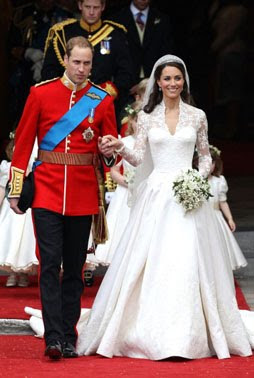 After months of speculation, The Dress was finally unveiled just before 6 a.m. ET. And the reviews are in. To get the fashion world’s reaction we caught up with European Editor at Large for Vogue, Hamish Bowles, and we sought the expert opinion of ELLE's Joe Zee, who took time off from his Sundance Channel show, All On The Line, to give us his initial take.
After months of speculation, The Dress was finally unveiled just before 6 a.m. ET. And the reviews are in. To get the fashion world’s reaction we caught up with European Editor at Large for Vogue, Hamish Bowles, and we sought the expert opinion of ELLE's Joe Zee, who took time off from his Sundance Channel show, All On The Line, to give us his initial take.It’s a unanimous victory. Kate’s ivory and white satin gown with a sweetheart neckline and long-sleeved V-neck lace overlay has cemented Kate’s status as a fashion icon. By choosing Sarah Burton at Alexander McQueen, a quintessential British designer, she proved her allegiance to her country and her worth as a newly minted style star.
The look was fittingly dramatic but also refined and elegant. There was none of the flounce and girlishness of Diana’s gown. Kate reportedly did her own makeup and kept her gorgeous long hair half up and half down. In other words, she looked like herself. Her modest elbow-length veil was held in place by a Cartier “halo” tiara lent to her by the queen.
ELLE’s creative director, Joe Zee, likened Burton’s creation to Grace Kelly’s wedding gown, which also had a lace bodice and full skirt. Vogue’s Hamish Bowles, was thrilled with Kate’s choice. Fittingly, the Met’s Costume Institute gala on Monday honors the late Alexander McQueen. No doubt Kate’s dress will be much talked about evidence that his legacy continues.
 For those aged in their 30s and 40s feeling down in the dump, don’t worry - happiness is just around the corner. Economists have found that despite a mid-life dip, people start to feel more content with their life after the age of 50.
For those aged in their 30s and 40s feeling down in the dump, don’t worry - happiness is just around the corner. Economists have found that despite a mid-life dip, people start to feel more content with their life after the age of 50. Certain foods can improve the way you look. The following nutrients will give your hair and nails extra luster, strength and shine.
Certain foods can improve the way you look. The following nutrients will give your hair and nails extra luster, strength and shine. It is one of our most basic functions, as important as the in and out of our breath. Our need for sleep is primal, yet the pace of life means it's often pushed to the periphery, sacrificed at the altar of work, friends, study and fun.
It is one of our most basic functions, as important as the in and out of our breath. Our need for sleep is primal, yet the pace of life means it's often pushed to the periphery, sacrificed at the altar of work, friends, study and fun.
